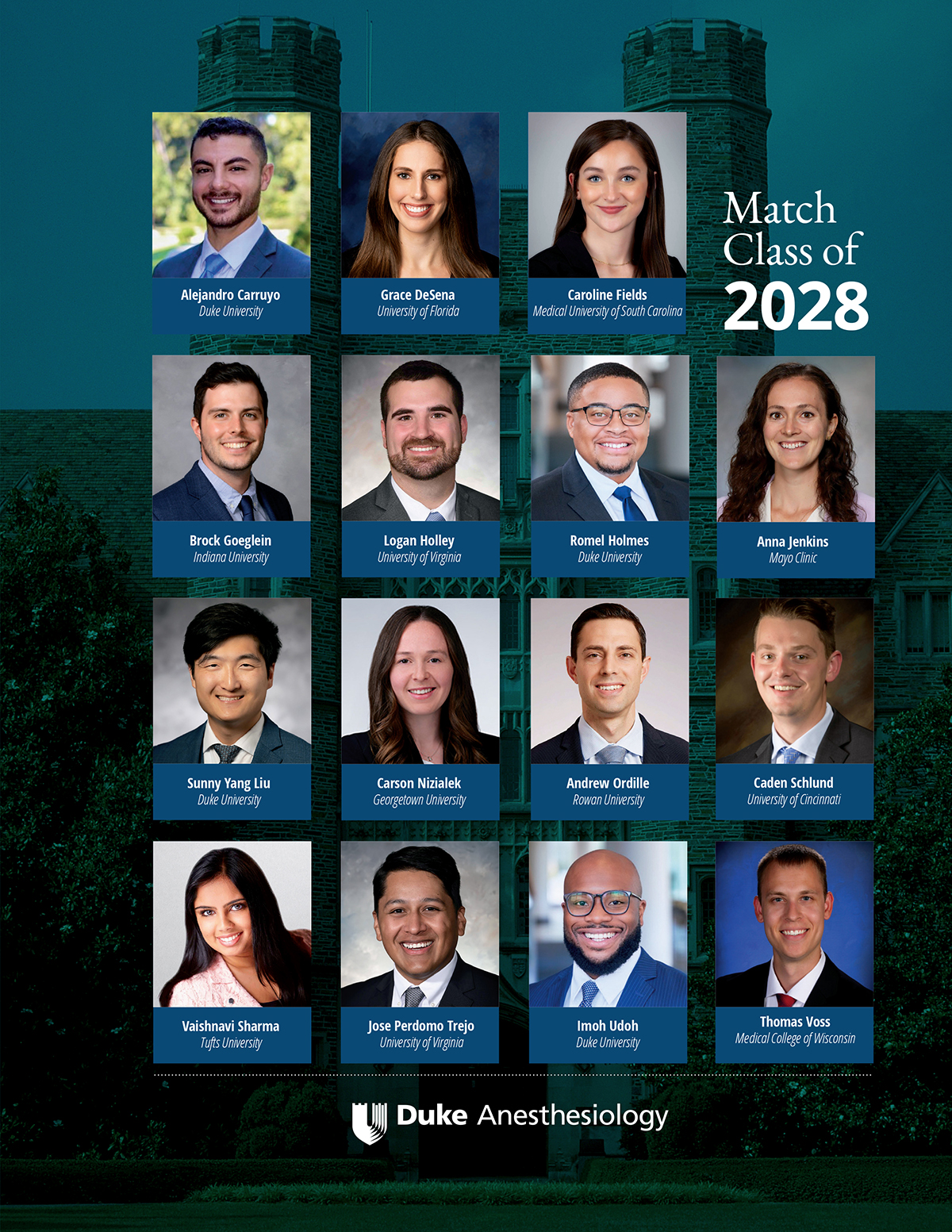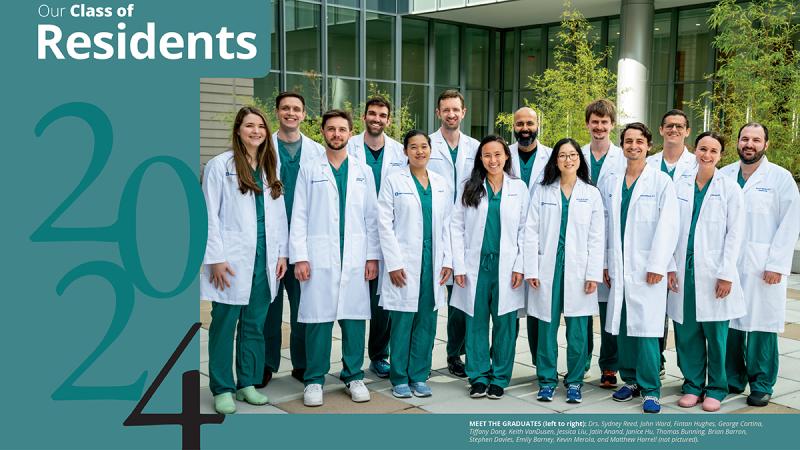
RESIDENCY RECAP
Residency Program Leadership

Director, Residency Program
Vice Chair for Education
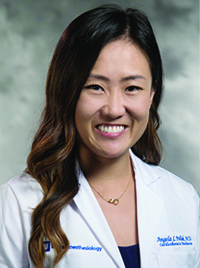
Assistant Director, Residency Program
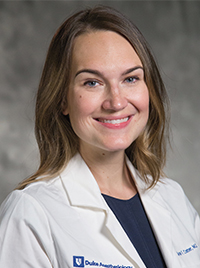
Assistant Director Residency Program
Resident Spotlight
Dr. Ashley Vincent | CA-2
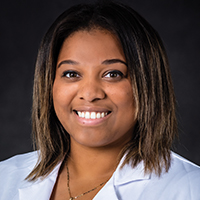
Born and raised in Flushing, Queens, the most ethnically diverse county in the United States, I have experienced crosscultural living from childhood. As a first-generation American from a working class, single parent household, a career in medicine seemed improbable - if not impossible. My teachers’ investment in my education enabled me to challenge myself academically, and I developed a strong interest and background in chemistry at Cornell University. There, my desire to become a doctor solidified both in and outside of the classroom.
My interest in medicine led me to shadow an anesthesiologist in New York, which ultimately influenced me to begin my medical training. During my anesthesiology rotations, I was immediately drawn to the emphasis on patient safety, advocacy, and maintenance of calm in the fast-paced operating room. I observed anesthesiologists respond to the hum of the monitors; they reacted precisely to changing physiology with medications and ensured the delivery of balanced anesthetic throughout the case. Safe and effective care was practiced daily by the anesthesiology care team, inspiring my desire to contribute. I felt empowered when caring for patients, and as a third-year medical student, I recognized and addressed a near-miss situation in the operating room. My voice was valued and changed the actions of the team. I was excited to join a field in which this culture is celebrated. As a budding anesthesiologist, I am committed to promoting service within my community, nurturing leaders of tomorrow, and providing humanistic value-driven care.
Dr. Andrew Whang | CA-3
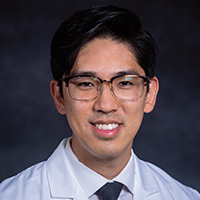
I have a running joke that one of my proudest accomplishments was attending and training in all four ACC universities in North Carolina. I earned my undergraduate degree at UNC, pursued my master’s degree at NC State, attended medical school at Wake Forest, and now find myself at Duke for residency. Despite being born and raised in New York City, my relocation for college marked a significant turning point, and I haven’t looked back since. While the natural beauty of North Carolina initially drew me in—the skies, mountains, trees, and beaches—it’s the people that have compelled me to stay. As I reflect on my residency journey, I am once again struck by the incredible individuals I am surrounded by. From the world-class faculty who mentor me to the diverse and supportive group of co-residents I train alongside, and the hardworking anesthesia techs and staff who make it all possible, I am continually inspired by those around me. Residency has been a transformative experience, shaping my identity from a student to a professional, healer, and leader, and the unwavering support I have received from faculty and coresidents alike has made all the difference.
My decision to pursue anesthesiology stems from its unique ability to care for patients across all stages of life— neonates, infants, children, teens, parturients, adults, and the elderly. During medical school, I found myself drawn to every medical and surgical specialty I encountered, and anesthesiology emerged as a perfect blend of elements from each. Moreover, anesthesiologists play a crucial role in managing the physiology of every organ system perioperatively. Patients’ pre-existing medical conditions do not simply vanish during surgery. It is our responsibility as anesthesiologists to see our patients as individual persons with distinct histories and experiences, and tailor our care accordingly. Anesthesiology is not a simple universal on-off switch; it requires meticulous planning and execution based on each patient’s unique needs as well as the flexibility to solve problems as they arise in the intraoperative setting. It is for these reasons I chose to pursue anesthesiology, and I am convinced that there is no better place to train than at Duke.
Alumni Shoutout
Nathan Waldron, MD, MHSc
‘16 Cardiothoracic and Critical Care, Mayo Clinic in Florida
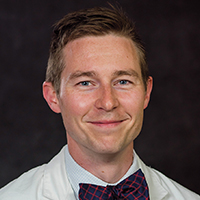
How has your training at Duke Anesthesiology accelerated your practice of anesthesiology?
I feel very grateful for the time I spent at Duke. During the time that I was there (medical school, residency, two fellowships, and a foray as faculty), I was constantly surrounded and mentored by experts in every perioperative domain whilst being involved in the care of incredibly complex patients. The depth and breadth of my training at Duke built a strong foundation for my career, and it’s been my honor and pleasure to continue building upon that foundation in my post-Duke life.
How did your training prepare you for being an anesthesiologist in a pandemic and now, postpandemic?
While I’d venture that none of us were really prepared for the seismic cultural changes that accompanied the pandemic, my training at Duke made the work part reasonably straightforward. My broad-based residency training meant that I was comfortable pivoting between different roles, tasks and venues to provide care to patients during the pandemic. Our didactic training in evaluating medical literature and the process of generating evidence gave me a good base to evaluate the rapidly-changing evidence base during the pandemic. Finally, my time spent as a critical care fellow at Duke helped cultivate a sense of comfort and familiarity with essentially all phenotypes of critical illness, which proved a tremendous boon during COVID. In the post-pandemic phase, the work ethic and collaborative ethos that we cultivated during training has been tremendously helpful in navigating my career.
What are your greatest lessons learned from the Duke Anesthesiology Residency Program?
This is a challenging question as a good chunk of my formative adult years were spent as a part of the Duke Anesthesiology department and I learned many lessons during this time, both personal and professional. From a professional standpoint, one of my biggest take-home messages was that trainees are not dissimilar to the somewhat fictitious aspect of goldfish – if you give them a big enough tank with enough great opportunities, they’ll continue to grow far beyond their initial expectations. From a personal standpoint, my time at Duke definitely helped me learn about appropriately valuing and nurturing my relationships with the people I love – my family.
What do you miss the most about Duke/Duke Anesthesiology?
The people. Being a part of Duke Anesthesiology – and Duke Health, in general – gives you access to true world-class experts in essentially any and every aspect of medicine. Not only does that mean that one can always tap into those folks’ knowledge base as a resource, it means that you get the privilege of being colleagues and forming friendships with people who are both frighteningly smart and wickedly fun to be around.
Why did you choose anesthesiology as your specialty?
I had an early interest in critical care medicine (CCM) and spent much of my time in medical school trying to figure out the best way to get there. During this germinal period, I was fortunate to come across a number of Duke Anesthesiology faculty who showed me the value of an anesthesiologist’s background in caring for critically ill patients. During residency, I happened to fall in love with adult cardiothoracic anesthesiology (ACTA) – again, due to the tremendous role models I was surrounded by at Duke. When it came time to choose what I did after residency, I chose to pursue both ACTA and CCM training as I wanted to be an expert in caring for the “sickest of the sick.” I love the type of clinical medicine that this training pathway set me up for – I’m at home in a variety of inpatient practice settings and it generally takes a lot to get me rattled. While the two years of fellowship were challenging, I look back upon them very fondly and am grateful for the knowledge/skills that I gained and the friends/colleagues I made along the way.
What keeps you going?
I’m blessed with a lot of really amazing aspects to my life. My wife and kids are the primary thing that keeps me excited to wake up in the morning. But every day I go to work, I’m sincerely honored to be able to provide clinical care to patients – they’re almost like an accessory family who I get to care for and protect during our time together. Finally, my compatriots at Mayo Clinic Florida are really amazing. I love spending time teaching the residents, joking with the CRNAs, nurses, OR/ICU staff, and chatting with attendings from a variety of specialties.
Advice for graduating residents?
If you’re training at Duke, you’re probably good at many things. Some of those things will garner recognition, but not all of them will engender a true sense of fulfillment. Pay attention to the overlap in the Venn diagram and maximize your efforts in that space.
Jenna Falcinelli, MD
‘17 Pediatrics, American Anesthesiology of the Carolinas
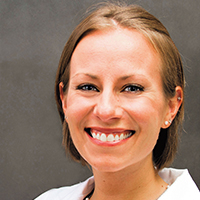
How has your training at Duke Anesthesiology accelerated your practice of anesthesiology?
My experience at Duke prepared me to live in the moment and handle whatever comes my way. I feel really fortunate to have trained under the best of the best. Coming out of training and being “on my own” was intimidating, but I quickly realized that I had the skills and preparation I needed to take on the spectrum of cases to take great care of patients. I also learned communication and leadership skills that are instrumental in my every day.
How did your training prepare you for being an anesthesiologist in a pandemic and now, postpandemic?
No one in our current generation had experienced a pandemic like COVID-19 before. I had completed my training when COVID-19 hit, and I was really grateful to have been trained in an environment that emphasized teamwork and leadership. We learned together, vented to each other, and ultimately prevailed because we stuck together.
What are your greatest lessons learned from the Duke Anesthesiology Residency Program?
Where to begin! At Duke, I learned how to take care of the sickest patients undergoing the most novel procedures and techniques to give them hope and a chance. I learned how to stay calm during chaos, take on leadership in the OR without needing acknowledgement, cherish all components of a good team, and how to debrief during physically/ mentally/emotionally challenging situations.
What do you miss the most about Duke/Duke Anesthesiology?
Without hesitation, the people! The relationships – with attendings, fellow residents, CRNAs, techs – formed during my training are unparalleled. The trials and tribulations we went through together formed bonds that are incomparable. I’m fortunate to still be in touch with several of these wonderful people!
Why did you choose anesthesiology as your specialty?
I love anesthesia because it combines medicine and surgery. We take care of patients during some of their most vulnerable moments and formulate a plan to help them stay safe and comfortable. I love the spectrum of our field – from utilizing critical thinking pre/intra/post-op, to placing lines or nerve blocks, to comforting women in labor or during C-sections. What we do is awesome and impactful. I especially love the pediatric population because their ailments are not their fault, thus it’s never difficult to be empathetic. Kids are incredibly resilient and honest – and tough. They’re just the best.
What keeps you going?
At home, my family – having three young kids and a supportive husband to come home to gives me great perspective on what’s most important. And at work, taking care of severely ill babies/kids gives me purpose. I feel like my training was long and rigorous, but so worth it every time that I have a pediatric patient who needs to have a procedure/surgery – I’m grateful that my training has enabled me to take great care of them. I especially love that our pediatric surgical/anesthesia team supports pediatric patients and their families so they can stay closer to home in eastern NC for at least some (if not all!) of their care, preventing frequent long trips to the Triangle.
Advice for graduating residents?
Give yourself grace. Be honest with yourself. Recognize you’re human and thus not perfect.
